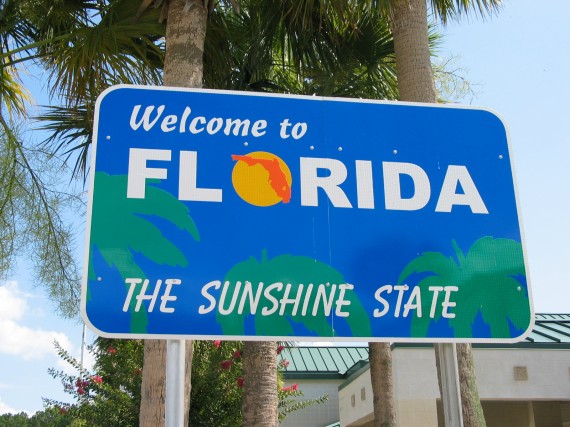It’s Official: Florida Passes New York To Become Third Most Populous State
After several years of anticipating that it would happen, the Census Bureau has officially confirmed that Florida has surpassed New York to become the third most populous state in the nation:
After years of staving off population challenges from the Sunshine State, New York has finally ceded its position as the nation’s third most populous state, falling to fourth behind California, Texas and Florida, according to new figures released on Tuesday by the United States Census Bureau.
The figures, which reflect population estimates for July 2014, show that Florida now has about 19.9 million residents, surging past New York’s 19.7 million. Demographers say that the new estimates reflect decades-old migration trends. According to the 2014 figures, Florida gained nearly 300,000 residents in the 12 months before July 2014, while New York gained just over 50,000.
This is something that has been anticipated for several years now, of course, due simply to the fact that Florida’s population has been growing much faster than New York’s for some time now, not the least due to people from New York moving to Florida due to retirement, better weather, better economic conditions, lower taxes, and a whole host of other reasons. As the new Census list shows, New York’s position at No. 4 is likely secure for some time come. Coming next in fifth place is Illinois with a population of roughly 12.88 million, Pennsylvania at 12.787 million, Ohio at 11.594 million, and then Georgia at 10.097 million, North Carolina at 9.943 million, and Michigan at 9.909 million. Eventually, Georgia may challenge Ohio’s spot on the list but its not likely to come from another decade or so unless the population growth rates in the Buckeye and Peach States change significantly.




People moving south for warm weather? The smart move is to just stay put and wait for the warm weather to get to you. I guess it makes sense for old people, who might not live long enough to experience the balmy NY winters that are coming.
Also, no one should consider moving to the Pacific Northwest for the weather. There is a running gag of pictures of Seattle landmarks with sunshine and gorgeous summer days photoshopped in. Don’t be fooled. It is a blighted hellhole of never ending gray and rain. Mordor, but damp. Also, the tree octopus is venomous, and cripples, kills or maims several hundred people each year.
This will change… once the water rises to a certain level and it becomes undeniable (and uninsurable)… not to mention all the shallow fresh water wells become brackish.
Many are already considering Miami to be our own Venice. (… no not SoCal, NorEast ITA)
http://www.pbs.org/newshour/rundown/south-florida-especially-vulnerable-rising-sea-levels/
http://www.rollingstone.com/politics/news/why-the-city-of-miami-is-doomed-to-drown-20130620
I guess all the derp will need to move to Georgia and Alabama.
Given the retiree drain from cold weather to warm it would be interesting to see if the net population gain is affecting the employment rate of each state. I fear this is beyond my googling patience limit as it is swamped by results for the unemployment rate, a very different number. For a retitement community, the unemployment and the employment rate could both be zero.
Heh, the old farts move to places with low taxes and then complain bitterly because there aren’t any health services for them or provide-a-ride services or help-with-my-senile-spouse services….
I wonder how they measured the population. Only holds if you leave out the main population of NYS, which is, of course, the deer.